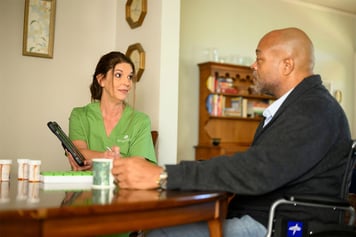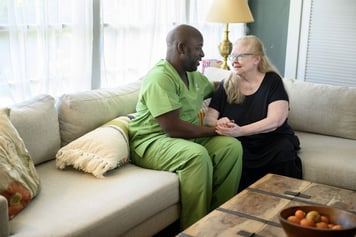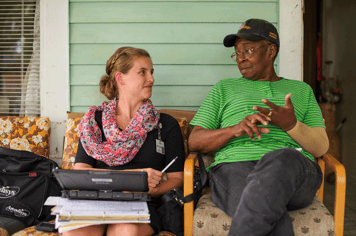When someone we know and love enters hospice care, finding the right words can feel daunting and overwhelming. We want to offer comfort and express love without fear of saying the wrong thing or triggering additional pain. This delicate balance can leave us uncertain about what to do, sometimes making us want to withdraw when they need us the most. This guide will offer some tips and recommendations on how to support both the patient and their loved ones.
Understanding the Hospice Journey
Before considering what to say, it’s important to understand what it means to be in hospice care. Hospice focuses on comfort, dignity and quality of life rather than curative treatment. The hospice team works with the patient, who has been given a prognosis of six months or less, and their family to ensure their final days are lived on their terms.
This is a profound transition, not just in medical care, but in how we relate to the loved one. Patients and their families are processing complex emotions, all at different rates and ranging from grief to acceptance to fear to peace.
What to Say to Hospice Patients
The most meaningful conversations come from a place of authenticity rather than rehearsed phrases. Acknowledge their journey to show respect for their new reality. By recognizing their experience rather than acting like everything is normal, you can create space for an honest and meaningful exchange.
You could say, “I can only imagine what you’re going through. I’m here to listen whenever you want to talk.” This acknowledges their situation while offering companionship and your comforting presence along the way.
Reminiscing can also bring joy and affirm the significance of their life story. Sharing specific memories can validate that their life mattered and will continue to influence others even when they’re gone.
Often, your simple presence can be the greatest gift. Don’t put pressure to fill silence or maintain conversation. Rather, you can offer to just sit with them, holding a hand or reading one of their favorite books or watching a movie or show to help create a peaceful environment.
In your visits, let the hospice patient guide the conversation. If they want to discuss practical matters like funeral arrangements or how to distribute possessions, listen attentively without judgment. If they share fears about death or what happens to those left behind, resist the urge to change the subject or offer false reassurance. Following their lead honors their autonomy during a time when so many choices have been removed.
How to Support Family Members of Hospice Patients
Family members and loved ones of hospice patients carry an immense emotional burden while also juggling practical responsibilities. Acknowledging their experience can provide crucial validation when they need it the most.
In addition to checking in on the patient, take time to check in with the family. Something as simple as, “What you’re doing is so important – how are you holding up?” creates space for an authentic response and connection.
Consider being very specific if you’re offering help. Instead of the standard, “Let me know if you need anything”, offer something tangible like, “I can bring dinner on Thursday,” or “I’d love to sit with Jim for a few hours so you can take a break.” This takes the pressure off the already over-burdened family member and can make it easier for them to accept your help.
Caregivers often set aside their own emotional needs to focus on the patient. Creating space for their feelings, over a walk or coffee or wine, can open a valve on suppressed emotions that need expressing.
What Not to Say
Some phrases, while well-intentioned, can land painfully during this sensitive time. Comments that minimize the experience like, “Everything happens for a reason” or “At least they lived a long life” may seem comforting but can feel dismissive to hear and can inadvertently invalidate their grief and complex emotions.
Be sure to also avoid false reassurance with phrases like, “they’ll be comfortable” or “don’t worry – everything will be fine.” Honesty, tempered with compassion, serves everyone better than empty promises or unrealistic positivity.
In our eagerness to connect, we sometimes shift conversations toward our own experiences. While briefly mentioning similar experiences you’ve gone through with family members, extended personal stories may end up further burdening loved ones with already limited emotional energy.
Practical Communication Tips
Timing matters in these situations. Be sensitive to their energy levels, which can fluctuate throughout the day. Keep visits short unless otherwise requested, always call before visiting and be prepared to reschedule if needed.
Always aim to listen more than you speak. Ask open-ended questions when appropriate, allow for silence when necessary and try not to interrupt or finish their sentences.
With the patient, also remember to honor their autonomy and agency. Ask permission before entering their space, be respectful if they’re not up for conversation and never make assumptions about their wishes.
Above All Else, Be Authentic
There’s no perfect script for talking to someone in hospice or their loved ones. Authentic connection matters most – showing up, being present and communicating with an open heart. Your willingness to engage during this difficult time is a profound gift.
When we approach these conversations with humility, compassion and respect, we create room for meaningful connection even amidst intense grief. These moments of genuine human connection can become treasured memories that comfort families long after their loved one has passed.
Remember that the hospice care team, including spiritual care counselors and social workers, are excellent resources if you need additional guidance on communication during this tender time.
For additional resources and guidance, check out the Conversation Project [1], which focuses on meaningful end-of-life conversations, the Hospice Foundation of America [2] and CaringInfo, a program of the National Alliance for Care at Home. [3]
Deb Gallaher, MSN, MBA, RN, NE-BC, CHPN, is a Senior Hospice Clinical Education Specialist for Amedisys. She has 10 years of experience in hospice and is passionate about sharing her insights on high-quality care.





